冀教版 小学六年级英语
冀教版六年级英语知识点总结

一、名词名词是指表示人、事物、动物、地方等的名称的词。
根据名词的不同形式,可以分为普通名词和专有名词。
普通名词一般不是以大写字母开头,而专有名词则是以大写字母开头。
二、代词代词是指代其他名词的词语,分为人称代词、指示代词、物主代词、不定代词等。
人称代词包括主格和宾格。
三、动词动词表示一个人或物主动或被动地做件事情,有时态、语态等变化。
常见的动词时态有一般现在时、一般过去时、一般将来时等。
四、形容词形容词是用来形容名词的词语,描述名词的特征和属性。
形容词通常在名词前面,有原级、比较级和最高级的变化。
五、副词副词是修饰动词、形容词、副词和短语的词语,用来表示地点、时间、方式、程度等。
副词有程度副词和频度副词等。
六、介词介词是连接名词、代词或动词与其他词语之间的词。
常见的介词有in、on、at等。
介词短语表示时间、地点、方位等。
七、连词连词是连接两个词、短语、句子等的词语,有并列连词、选择连词、从属连词等。
常见的连词有and、but、or等。
八、数词数词是表示数目和顺序的词语,包括基数词、序数词、小数、分数、百分数等。
九、冠词冠词是位于名词前面用来限定名词范围的专用词,有不定冠词和定冠词。
十、谓语动词谓语动词是指一个句子中真正发出动作或表达状态的动词,具有人称、数和时态等变化。
十一、主谓一致主谓一致是指谓语动词和主语在人称和数方面保持一致。
十二、句子的基本结构英语句子的基本结构一般包括主语、谓语、表语、宾语、定语、状语等成分。
十三、简单句和并列句简单句是由一个主谓结构构成的句子,而并列句是由两个或多个简单句通过并列连词连接而成的句子。
十四、疑问句疑问句是用来问问题的句子,根据回答的方式分为一般疑问句和特殊疑问句。
十五、祈使句祈使句是用来表示请求、命令、劝告等的句子,一般省略了主语。
十六、感叹句感叹句是表达强烈的情感、态度的句子,通常以感叹词开头。
十七、间接引语间接引语是通过引述他人的话来间接地表达其中一种含义,常常由连词that引导。
(完整版)冀教版小学英语六年级单词表完美打印版.doc
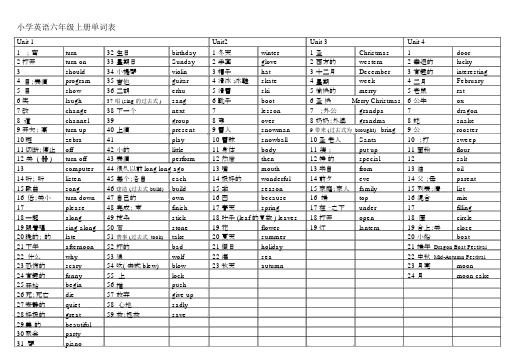
小学英语六年级上册单词表Unit 1 Unit2 Unit 3 Unit 41 ;弯turn 32 生日birthday 1 冬天winter 1 圣Christmas 1 door2 打开turn on 33 星期日Sunday 2 手套glove 2 西方的western 2 幸运的lucky3 should 34 小提琴violin 3 帽子hat 3 十二月December 3 有趣的interesting4 目;表演program 35 吉他guitar 4 滑冰 ;冰鞋skate 4 星期week 4 二月February5 目show 36 二胡erhu 5 滑雪ski 5 愉快的merry 5 老鼠rat6 笑laugh 37 唱 (sing 的过去式 ) sang 6 靴子boot 6 圣快Merry Christmas 6 公牛ox7 改change 38 下一个next 7 lesson 7 ;外公grandpa 7 dragon8 道channel 39 group 8 穿over 8 奶奶;外婆grandma 8 蛇snake9 开大;高turn up 40 上演present 9 雪人snowman 9 带来 (过去式为 brought) bring 9 公rooster10 斑zebra 41 play 10 雪球snowball 10 圣老人Santa 10 ;打sweep11 切断;停止off 42 小的little 11 身体body 11 装;put up 11 面粉flour12 关 (器 ) turn off 43 表演perform 12 然后then 12 特的special 12 salt13 computer 44 很久以前long long ago 13 嘴mouth 13 来自from 13 油oil14 听;听listen 45 每个;各自each 14 极好的wonderful 14 前夕eve 14 父;母parent15 歌曲song 46 建造(过去式build) build 15 季season 15 家庭;家人family 15 列表;清list16 低;关小turn down 47 自己的own 16 因because 16 端top 16 混合mix17 please 48 完成;束finish 17 春天spring 17 在⋯之下under 17 filling18 一起along 49 枝条stick 18 叶子 (leaf 的复数 ) leaves 18 打开open 18 圈circle19 跟着唱sing along 50 石stone 19 花flower 19 灯lantern 19 合上;关close20 晚的;的late 51 费事 (过去式 took) take 20 夏天summer 20 小船boat21 下午afternoon 52 坏的bad 21 假日holiday 21 端午 Dragon Boat Festival22 什么why 53 狼wolf 22 海sea 22 中秋 Mid-Autumn Festival23 恐怖的scary 54 吹(去式 blew) blow 23 秋天autumn 23 月亮moon24 有趣的funny 55 上lock 24 月moon cake25 开始begin 56 推push26 死;死亡die 57 放弃give up27 安静的quiet 58 心地sadly28 好极的great 59 救;拯救save29 美的beautiful30 聚会party31 琴piano小学英语六年级下册单词表(新版)Unit 1 Unit2 Unit 3 Unit 41 ⋯打call 1 故事story 31 享受;喜enjoy 1 祖母;外祖母grandmother 1 惊喜surprise2 找到;find 2 tortoise 32 从那起from then on 2 祖父;外祖父grandfather 2 照片photo3 只是;just 3 比race 33 坐(去式 ) sat 3 游泳 (去 ) swam 3 得;起remember4 片刻;瞬moment 4 道路road 34 庄稼crop 4 船;ship 4 please5 等一下just a moment 5 慢慢地slowly 35 狼wolf 5 姑;姨aunt 5 干cookie6 来come over 6 说;讲 ( 过去式 ) said 36 死kill 6 叔叔;伯父uncle7 恐dinosaur 7 匆忙;赶hurry 37 明的clever 7 堂(表)兄弟姐妹cousin8 挂断hold on 8 湖lake 38 藏hide 8 希望hope9 ;try 9 跑 (去式 ) ran 39 喊;哭 (过去 ) cried 9 希望学校Hope School10 瘦的thin 10 感 (去 ) felt 40 追赶run after 10 的;其他else11 不起sorry 11 想(去式 ) thought 41 安全的safe 11 地;露camp12 再goodbye 12 赶上catch up with 42 必须;不得不have to 12 精彩的amazing13 响;按ring 13 保持 (去 ) kept 43 吃(去式 ) ate 13 很好地well14 潮湿的wet 14 睡 (去 ) slept 44 离开 (去 ) left 14 是(are 过去式 ) were15 出故障的broken 15 已already 45 go on 15 ;震shake16 挂断hang up 16 定的steady 46 找look for 16 扔;抛 (过去 ) threw17 帮助help 17 慢而稳者赢Slow and steady 47 能 (去 ) could 17 天空;空气air18 抱hug wins the race. 48 呼吸breathe 18 ;筐basket19 制作 (过去式 ) made 18(到 )机会turn 49 很快地;迅速地quickly 19 投make a basket20 去滑雪go skiing 19 骨bone 20 高地happily21 超市supermarket 20(去 ) found 21 ;改change22 的wrong 21 拿;携带 ;搬运carry 22 俄斯Russia23 怪;怪物monster 22 山mountain 23 滑水water skiing24 最后;最finally 23 另一个another 24 火fire25 得到 (过去式 ) got 24 比;超than 25 一meal26 ;教lesson 25 吠叫bark 26 篝火campfire27 悲哀地sadly 26 民;夫farmer 27 文化culture28 周末weekend 27 当⋯as 28 自然nature29 maple 28 恐惧scared 29 合作teamwork30 糖syrup 29 开始start31 甜的sweet 30 拿着 (去 ) took。
六年级英语冀教版教案及反思(优质21篇)

六年级英语冀教版教案及反思(优质21篇)(实用版)编制人:__________________审核人:__________________审批人:__________________编制单位:__________________编制时间:____年____月____日序言下载提示:该文档是本店铺精心编制而成的,希望大家下载后,能够帮助大家解决实际问题。
文档下载后可定制修改,请根据实际需要进行调整和使用,谢谢!并且,本店铺为大家提供各种类型的实用资料,如工作总结、工作报告、党团范文、工作计划、演讲稿、活动总结、行政公文、文秘知识、作文大全、其他资料等等,想了解不同资料格式和写法,敬请关注!Download tips: This document is carefully compiled by this editor.I hope that after you download it, it can help you solve practical problems. The document can be customized and modified after downloading, please adjust and use it according to actual needs, thank you!Moreover, our store provides various types of practical materials for everyone, such as work summaries, work reports, Party and Youth League model essays, work plans, speeches, activity summaries, administrative documents, secretarial knowledge, essay summaries, and other materials. If you want to learn about different data formats and writing methods, please stay tuned!六年级英语冀教版教案及反思(优质21篇)在教学设计中,教案是教师为了实现教学目标而制定的一种具有操作性和可实施性的计划。
冀教版六年级英语上册各单元知识点汇总
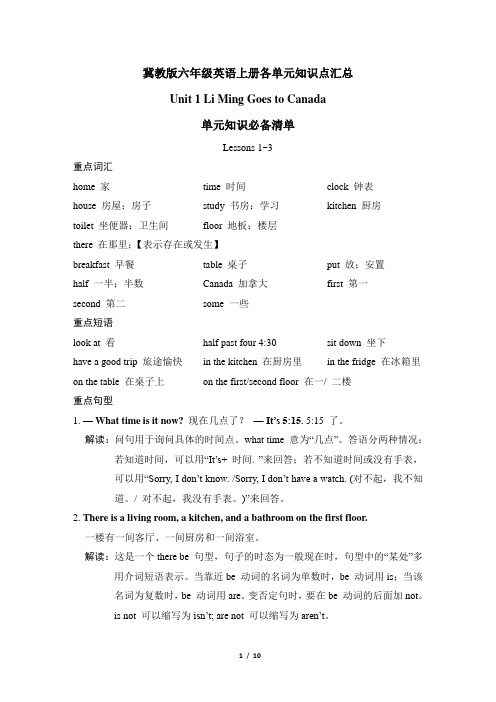
冀教版六年级英语上册各单元知识点汇总Unit 1 Li Ming Goes to Canada单元知识必备清单Lessons 1~3重点词汇home 家time 时间clock 钟表house 房屋;房子study 书房;学习kitchen 厨房toilet 坐便器;卫生间floor 地板;楼层there 在那里;【表示存在或发生】breakfast 早餐table 桌子put 放;安置half 一半;半数Canada 加拿大first 第一second 第二some 一些重点短语look at 看half past four 4:30 sit down 坐下have a good trip 旅途愉快in the kitchen 在厨房里in the fridge 在冰箱里on the table 在桌子上on the first/second floor 在一/ 二楼重点句型1. — What time is it now?现在几点了?—It’s 5:15. 5:15 了。
解读:问句用于询问具体的时间点。
what time 意为“几点”。
答语分两种情况:若知道时间,可以用“It’s+ 时间. ”来回答;若不知道时间或没有手表,可以用“Sorry, I don’t know. /Sorry, I don’t have a watch. (对不起,我不知道。
/ 对不起,我没有手表。
)”来回答。
2. There is a living room, a kitchen, and a bathroom on the first floor.一楼有一间客厅、一间厨房和一间浴室。
解读:这是一个there be 句型,句子的时态为一般现在时,句型中的“某处”多用介词短语表示。
当靠近be 动词的名词为单数时,be 动词用is;当该名词为复数时,be 动词用are。
变否定句时,要在be 动词的后面加not。
is not 可以缩写为isn’t; are not 可以缩写为aren’t。
冀教版六年级英语重点句型和单词
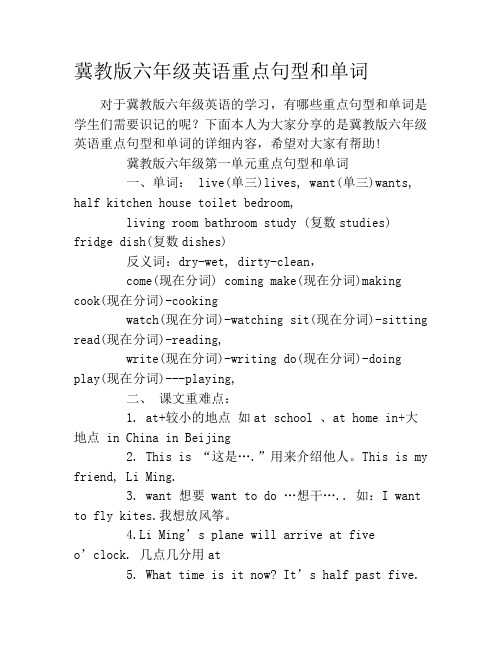
冀教版六年级英语重点句型和单词对于冀教版六年级英语的学习,有哪些重点句型和单词是学生们需要识记的呢?下面本人为大家分享的是冀教版六年级英语重点句型和单词的详细内容,希望对大家有帮助!冀教版六年级第一单元重点句型和单词一、单词: live(单三)lives, want(单三)wants, half kitchen house toilet bedroom,living room bathroom study (复数studies) fridge dish(复数dishes)反义词:dry-wet, dirty-clean,come(现在分词) coming make(现在分词)making cook(现在分词)-cookingwatch(现在分词)-watching sit(现在分词)-sitting read(现在分词)-reading,write(现在分词)-writing do(现在分词)-doing play(现在分词)---playing,二、课文重难点:1. at+较小的地点如at school 、at home in+大地点 in China in Beijing2. This is “这是….”用来介绍他人。
This is my friend, Li Ming.3. want 想要want to do …想干….. 如:I want to fly kites.我想放风筝。
4.Li Ming’s plan e will arrive at fiveo’clock. 几点几分用at5. What time is it now? It’s half past five.现在几点了?现在5:30.6. Did you have a good trip? Yes, thanks. but I’m tired你旅行愉快吗?是的,谢谢。
但是我有些累。
7. Let’s go home./ Let me help you.让我们回家。
(冀教版)英语六年级上册(三年级起点)单词表
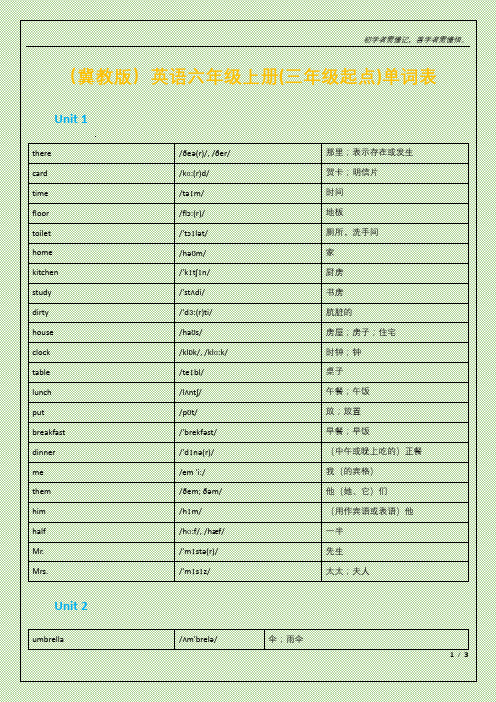
(冀教版)英语六年级上册(三年级起点)单词表Unit 1there/ðeə(r)/, /ðer/那里;表示存在或发生card/kɑ:(r)d/贺卡;明信片time/taɪm/时间floor/flɔ:(r)/地板toilet/'tɔɪlət/厕所,洗手间home/həʊm/家kitchen/'kɪtʃɪn/厨房study/'stʌdi/书房dirty/'dɜ:(r)ti/肮脏的house/haʊs/房屋;房子;住宅clock/klɒk/, /klɑ:k/时钟;钟table/teɪbl/桌子lunch/lʌntʃ/午餐;午饭put/pʊt/放;放置breakfast/'brekfəst/早餐;早饭dinner/'dɪnə(r)/(中午或晚上吃的)正餐me/em 'i:/我(的宾格)them/ðem; ðəm/他(她、它)们him/hɪm/(用作宾语或表语)他half/hɑ:f/, /hæf/一半Mr./'mɪstə(r)/先生Mrs./'mɪsɪz/太太;夫人Unit 2umbrella/ʌm'brelə/伞;雨伞class/klɑ:s/, /klæs/班;班级always/'ɔ:lweɪz/总是;一直ill/ɪl/有病;不舒服driver/'draɪvə(r)/司机lesson/'lesn/课word/wɜ:(r)d/单词its/ɪts/它的well/wel/健康;身体好Ms./mɪz/(用于女子的姓氏或者姓名前,不指明婚否)女士sometime/'sʌmtaɪm/某个时候Unit 3ear/ɪə/, /ɪr/耳朵eye/aɪ/眼睛mouth/maʊθ/嘴nose/nəʊz/鼻子can/kæn; kən/能autumn/'ɔ:təm/秋天spring/sprɪŋ/春天summer/'sʌmə(r)/夏天winter/'wɪntə(r)/冬天season/'si:zn/季节arm/ɑ:(r)m/胳膊body/'bɒdi/, /'bɑ:di/身体head/hed/头leg/leg/腿why/waɪ/为什么think/θɪŋk/想;想要again/ə'gen/, /ə'geɪn/adv.再一次;又一次put on/'pʊt ɒn/增加(体重);发胖take off/'teɪk ɒf/脱下(衣服);(飞机等)起飞Unit 4tomorrow/tə'mɒrəʊ/, /tə'mɑ:rəʊ/明天bring/brɪŋ/带来open/'əʊpən/开着的then/ðen/那时little/'lɪtl/小的song/sɒŋ/, /sɔ:ŋ/歌曲holiday/'hɒlədeɪ/, /'hɑ:lədeɪ/假日;节日give/gɪv/提供;交给put up搭起;举起。
冀教版小学英语六年级(上册)第一单元第一课

Homework:
• Make a clock by yourself and say the time in English.
• Show the rooms in your house.
•知识回顾 Knowledge Review
• 1.旅途愉快 Have a good tirp! • 2.回家 go home • 3.learn English 学英语 • 4.十个月 ten months • 5.at the airport 在机场 • 6. 4:30 half past four
New Words :
• learn 学习 arrive 到达 airport 机场 • have a good tirp 旅途愉快 • want to do ... • What time is it ? • It’s ......
• Ten months
• b.When will Li Ming go home?
• He will go home on June 25.
• c.How does Li Ming feel after the trip?
• He feels tired.
2.Ask and answer.Then write.
He wants to learn English! 他想学习英语!
Li Ming arrives today! 李明今天到达!
Today is September 1. 今天是9月1日。
He will go home on June 25. 他将在6月25日回家。 That’s ten months! 那是10个月!
• a.It’s one o’clock in the morning in Ottawa.
冀教 英语 六年级 上 百词
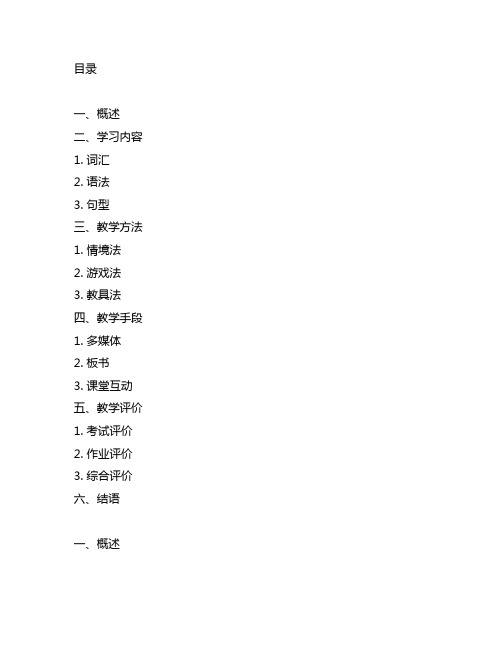
目录一、概述二、学习内容1. 词汇2. 语法3. 句型三、教学方法1. 情境法2. 游戏法3. 教具法四、教学手段1. 多媒体2. 板书3. 课堂互动五、教学评价1. 考试评价2. 作业评价3. 综合评价六、结语一、概述冀教版教材是六年级上册英语教材,作为小学英语教学的重要一环,六年级上册的教学内容和教学方法对于培养学生的英语语言能力和兴趣具有重要意义。
教师要全面了解教材要求,科学合理地安排教学,采用多种方式,多种手段,多种角度教学,注重培养学生的实际语言能力,提高学生的英语综合素质。
本文将针对冀教版六年级上册英语教材的百词内容,从学习内容、教学方法、教学手段和教学评价等方面展开讨论。
二、学习内容1. 词汇冀教版六年级上册英语教材的百词内容,主要包括日常生活常用词汇,如数字、颜色、动物、家庭成员、食物等。
学生需要掌握这些词汇的发音、拼写和基本意义,并能够在日常交流中正确运用,从而建立起扎实的词汇基础。
2. 语法在语法方面,六年级上册的教材主要包括一般现在时的肯定句和否定句、动词的过去式、祈使句等内容。
学生需要掌握这些基本的语法知识,能够正确地运用在日常交流和书面表达中。
3. 句型除了词汇和语法外,六年级上册的教材还包括一些基本的句型,如主语+谓语+宾语结构的句子、特殊疑问句等。
学生需要通过课堂学习和实际练习,掌握这些句型的构成和运用。
三、教学方法1. 情境法针对百词内容,教师可以通过情境法进行教学,即通过模拟真实情景,让学生在实际语言环境中学习和运用词汇、语法和句型。
在教授动物的词汇时,可以设计游戏或角色扮演的情境,让学生在玩中学,从而提高学习的趣味性和有效性。
2. 游戏法游戏是小学生喜欢的学习方式,教师可以设计各种与百词内容相关的英语游戏,如单词拼图、词汇接龙、句型填空等,激发学生学习英语的兴趣,增强学习的互动性和趣味性。
3. 教具法在教学过程中,教师可以通过图片、录音、视瓶等多种多样的教学辅助工具,帮助学生更直观、更形象地理解和掌握百词内容,提高学习的效果和质量。
六年级上册英语书内容冀教版
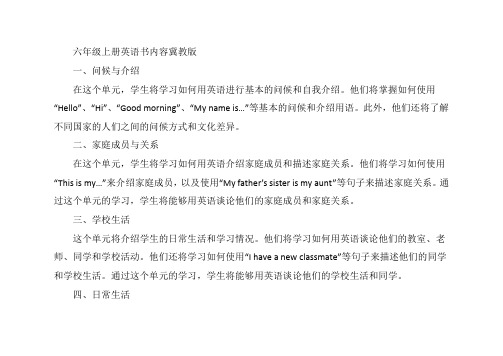
六年级上册英语书内容冀教版一、问候与介绍在这个单元,学生将学习如何用英语进行基本的问候和自我介绍。
他们将掌握如何使用“Hello”、“Hi”、“Good morning”、“My name is…”等基本的问候和介绍用语。
此外,他们还将了解不同国家的人们之间的问候方式和文化差异。
二、家庭成员与关系在这个单元,学生将学习如何用英语介绍家庭成员和描述家庭关系。
他们将学习如何使用“This is my…”来介绍家庭成员,以及使用“My father’s sister is my aunt”等句子来描述家庭关系。
通过这个单元的学习,学生将能够用英语谈论他们的家庭成员和家庭关系。
三、学校生活这个单元将介绍学生的日常生活和学习情况。
他们将学习如何用英语谈论他们的教室、老师、同学和学校活动。
他们还将学习如何使用“I have a new classmate”等句子来描述他们的同学和学校生活。
通过这个单元的学习,学生将能够用英语谈论他们的学校生活和同学。
四、日常生活在这个单元,学生将学习如何用英语谈论他们的日常生活习惯和兴趣爱好。
他们将学习如何使用“I usually…”等句子来描述他们的日常生活习惯,以及使用“I like…”等句子来表达他们的兴趣爱好。
此外,他们还将了解不同国家的日常生活习惯和文化差异。
五、时间和日期这个单元将教学生如何用英语谈论时间和日期。
他们将学习如何使用“What time is it?”、“It’s…o’clock”等句子来谈论时间,以及使用“Today is…”等句子来谈论日期。
此外,他们还将了解不同国家和地区的时差和文化差异。
六、天气与季节在这个单元,学生将学习如何用英语谈论天气和季节。
他们将学习如何使用“What’s the weather like?”、“It’s…and…”等句子来谈论天气,以及使用“My favorite season is…”等句子来表达他们对不同季节的喜好。
【冀教版】 六年级上册英语-Unit 1 Lesson 3 Making breakfast

冀教版六年级上册英语-Unit 1 Lesson 3 Making breakfast Part 1: VocabularyBefore we start talking about making breakfast, let’s first go over some key vocabulary words that we need to know.•eggs (n.) - round or oval-shaped objects that a female bird (such as a chicken) lays and that can be eaten as food•milk (n.) - a white liquid that comes from cows, goats, or other animals and that is used for making butter, cheese, etc., and as a drink •salt (n.) - a white substance that is added to food to give it flavor•pepper (n.) - a powder that comes from a hot and spicy plant and that is used to give food a strong, spicy taste•oil (n.) - a thick, smooth, dark liquid that is used as a fueland for making plastics, medicines, etc.; also used to cook food•butter (n.) - a pale yellow substance made from cream that is spread on bread and used in cooking•toast (n.) - bread that has been dried and browned by heat•jam (n.) - a sweet, often soft food made by cooking fruit with sugar to preserve it•pancakes (n.) - a thin, flat cake that is made by cooking batter on both sides in a frying panPart 2: DialogueNow that we know the vocabulary, let’s look at a dialogue between two people who are making breakfast together. In this dialogue, we will see how the vocabulary words listed above are used.Alice and John are in the kitchen making breakfast.Alice: John, do we have any eggs left?John: Yeah, we have a dozen in the fridge.Alice: Great. How about milk? Do we have enough for pancakes?John:Umm, I’m not sure. Would you mind checking?Alice: No problem. opens fridge Oh, we only have a little bit left. I’ll use it for the pancakes, and we’ll have toast with butter and jam on the side.John: Sounds good. Do you want me to make the pancakes?Alice:Sure. I’ll get started on the toast.John: Alright. grabs mixing bowl and pancake mix Let’s see. Itsays we need 1 cup of milk. How much do we have left?Alice: About a quarter cup, I think.John:Okay. I’ll just use water to make up the rest.Alice: Sounds like a plan. Let me know if you need any help.John: Will do. mixes pancake batterAlice:pops bread into the toaster Here, let me put some butter on the toast when it’s done.John: Thanks. heats up frying pan Do you want any pepper on your eggs?Alice:No, I’ll just have a little salt.John: Okay. cracks eggs into pan How do you like your eggs cooked?Alice: Scrambled, please.John: You got it. scrambles eggsAlice:puts jam on toast Breakfast is almost ready!John:flips pancakes Perfect timing!Part 3: PracticeNow, let’s practice usin g the new vocabulary in some sentences.1.I love eating scrambled eggs with cheese.2.Pour the milk into the mixing bowl and stir it together with the pancake mix.3.I like to put salt and pepper on my toast with butter.4.My favorite kind of jam is strawberry.5.Pancakes are best served with syrup and butter.6.It’s important to use oil in the pan when cooking eggs to prevent them from sticking.7.I always add a little bit of pepper to my eggs for extra flavor.8.Toasted bread with butter and jam is a classic breakfast combination.9.Making breakfast together is a great way to start the day.10.Don’t forget to turn off the stove when you’re finished cooking!ConclusionMaking breakfast is a fantastic way to start your day off right.With some basic ingredients like eggs, milk, and butter, you can create a delicious meal that will keep you energized and happy all morning long. By using the vocabulary words we learned and practicing some example sentences, you’ll be able to talk about breakfast in English with ease!。
【冀教版】六年级英语上册知识点归纳
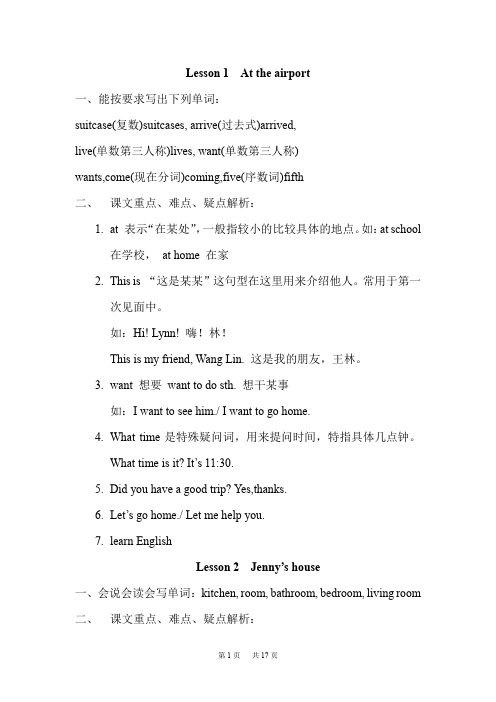
Lesson 1 At the airport一、能按要求写出下列单词:suitcase(复数)suitcases, arrive(过去式)arrived,live(单数第三人称)lives, want(单数第三人称)wants,come(现在分词)coming,five(序数词)fifth二、课文重点、难点、疑点解析:1.at 表示“在某处”,一般指较小的比较具体的地点。
如:at school在学校,at home 在家2.This is “这是某某”这句型在这里用来介绍他人。
常用于第一次见面中。
如:Hi! Lynn! 嗨!林!This is my friend, Wang Lin. 这是我的朋友,王林。
3.want 想要want to do sth. 想干某事如:I want to see him./ I want to go home.4.What time是特殊疑问词,用来提问时间,特指具体几点钟。
What time is it? It’s 11:30.5.Did you have a good trip? Yes,thanks.6.Let’s go home./ Let me help you.7.learn EnglishLesson 2 Jenny’s house一、会说会读会写单词:kitchen, room, bathroom, bedroom, living room二、课文重点、难点、疑点解析:1.This is / That is / These are/ Here is/ Here are2.What’s in the bedroom?3.名词性物主代词mine, yours的用法。
Lesson 3 Making breakfast一、会说会读会写单词:stove, refrigerator, sink,二、能按要求写出下列单词:make(现在分词)---making, dish(复数)---dishescook(现在分词)---cooking三、课文重点、难点、疑点解析:1.Time for breakfast.= It’s time for breakfast.2.It’s time for sth./ It’s time to do sth.3.Would like sth./ Would like to do sth.4.What would you like for breakfast / lunch/supper? I would like…5.Breakfast is ready.6.in the kitchen / refrigerator /sink on the stove / table7.wash dishesLesson 4 In the bathroom一、会说会读会写单词:bathtub, mine, yours, shower, clean, dirty二、课文重点、难点、疑点解析:1. A is mine. / B is yours.2. Where is Li Ming? He is in the living room. / Where are the dishes?They are on the table.3. help sb(to) do sth. 如:Can you help me learn English?/ Let’s helpMum make breakfast.4. on 用于特指的某一天(上午、下午等)。
冀教版小学英语6年级上下册单词表(打印版)
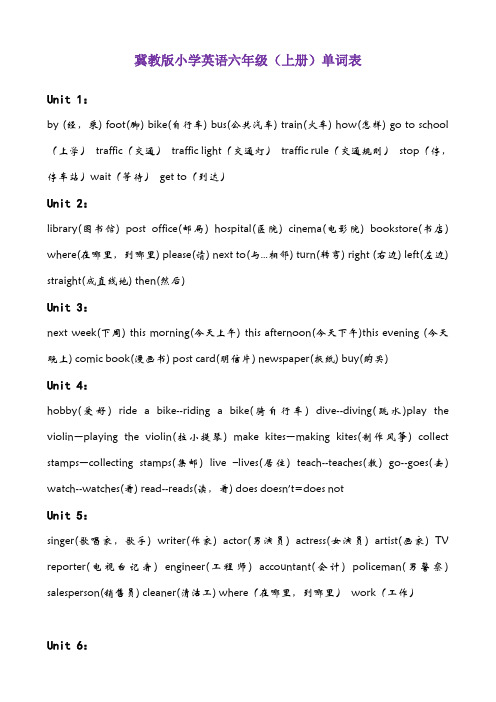
冀教版小学英语六年级(上册)单词表Unit 1:by (经,乘) foot(脚) bike(自行车) bus(公共汽车) train(火车) how(怎样) go to school (上学)traffic(交通)traffic light(交通灯)traffic rule(交通规则)stop(停,停车站)wait(等待)get to(到达)Unit 2:library(图书馆) post office(邮局) hospital(医院) cinema(电影院) bookstore(书店) where(在哪里,到哪里) please(请) next to(与…相邻) turn(转弯) right (右边) left(左边) straight(成直线地) then(然后)Unit 3:next week(下周) this morning(今天上午) this afternoon(今天下午)this evening (今天晚上) comic book(漫画书) post card(明信片) newspaper(报纸) buy(购买)Unit 4:hobby(爱好) ride a bike--riding a bike(骑自行车) dive--diving(跳水)play the violin—playing the violin(拉小提琴) make kites—making kites(制作风筝) collect stamps—collecting stamps(集邮) live –lives(居住) teach--teaches(教) go--goes(去) watch--watches(看) read--reads(读,看) does doesn’t=does notUnit 5:singer(歌唱家,歌手) writer(作家) actor(男演员) actress(女演员) artist(画家) TV reporter(电视台记者) engineer(工程师) accountant(会计) policeman(男警察) salesperson(销售员) cleaner(清洁工) where(在哪里,到哪里)work(工作)Unit 6:rain(雨) cloud (云) sun(太阳) stream(河,溪) come from(来自,从…来) seed(种子) soil(土壤) sprout (苗,芽) plant(植物,种植) should (应该) then(然后)冀教版小学英语六年级(下册)单词表Unit 1:tall—taller更高的short—shorter 更矮的strong—stronger更强壮的old—older 年龄更大的young—younger 更年轻的big—bigger更大的heavy—heavier 更重的long—longer 更长的thin—thinner 更瘦的small—smaller (体型)更小的Unit 2:have a fever 发烧have a sore throat喉咙疼have a cold感冒have a toothache 牙疼have a headache 头疼matter事情,麻烦sore 疼的hurt疼痛nose 鼻子tired疲劳的,累的excited兴奋的angry生气的happy高兴的bored无聊的,烦人的sad 忧伤的,悲伤的Unit 3:watch—watched 看wash—washed 洗clean—cleaned打扫play—played玩visit—visited 看望do—did last weekend上一个周末go—went去go to a park—went to a park 去公园go swimming—went swimming去游泳go fishing—went fishing去钓鱼read—read 读go hiking—went hiking 去郊游Unit 4:learn Chinese—learned Chinese学汉语sing and dance—sang and danced 唱歌和跳舞eat good food—ate good food吃好吃的食物take pictures—took pictures 照相climb—climbed 爬have—had buy presents—bought presents买礼物row a boat—rowed a boat 划船see elephant—saw elephant 看大象go skiing—went skiing 去滑雪go ice-skating—went ice-skating 去滑冰how怎么,如何get—got 到达last上一个的,仅余的,留在最后的。
冀教版英语六年级上册
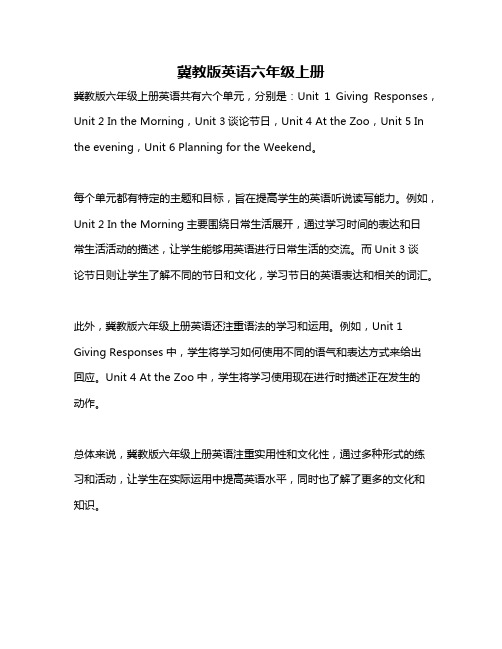
冀教版英语六年级上册
冀教版六年级上册英语共有六个单元,分别是:Unit 1 Giving Responses,Unit 2 In the Morning,Unit 3谈论节日,Unit 4 At the Zoo,Unit 5 In the evening,Unit 6 Planning for the Weekend。
每个单元都有特定的主题和目标,旨在提高学生的英语听说读写能力。
例如,Unit 2 In the Morning主要围绕日常生活展开,通过学习时间的表达和日
常生活活动的描述,让学生能够用英语进行日常生活的交流。
而Unit 3谈
论节日则让学生了解不同的节日和文化,学习节日的英语表达和相关的词汇。
此外,冀教版六年级上册英语还注重语法的学习和运用。
例如,Unit 1 Giving Responses中,学生将学习如何使用不同的语气和表达方式来给出
回应。
Unit 4 At the Zoo中,学生将学习使用现在进行时描述正在发生的
动作。
总体来说,冀教版六年级上册英语注重实用性和文化性,通过多种形式的练习和活动,让学生在实际运用中提高英语水平,同时也了解了更多的文化和知识。
冀教版六年级上册英语《On the School Bus》School in CanadaPPT课件

Lesson 7 On the School Bus
1. Listen and try to sing a song with music.
2. Free talk. How are you? What day is it today? What’s the date today? How’s the weather today?
巩固操练
教师给每个学生一张表格(如:下图), 教师描述表格中每个人所做的事情,让 学生完成表格。
Name do homework
watch TV walk to school wear dresses
Jenny
Steven Danny
2023/12/3
巩固练习
一、根据汉语提示写单词补全句子。
1. I
早上好,斯科特女士。 早上好!
2023/12/3
课文原文
1.Li Ming and Jenny go to school.
李明:你总是坐公共汽车上学吗? 詹妮:不,我有时候骑自行车。但是我经常坐公共汽车去上学。 李明:你步行去上学吗? 詹妮:不,我从不步行上学。我住得离学校太远了。
2023/12/3
2.结合以上信息,仿照Part 1进行小组对话创编表演。
1. Words: always, often, sometimes, never
2. Phrases & Sentences: by bus, by car, ride a bike, walk I go to school by bus. I ride my bike. I go to school by car. I walk to school.
冀教版 六年级上册英语-Unit 3 Lesson 13 Seasons

冀教版六年级上册英语-Unit 3 Lesson 13 SeasonsVocabulary•season 季节•winter 冬天•spring 春天•summer 夏天•fall/autumn 秋天•cold 冷的•warm 温暖的•hot 热的•cool 凉爽的##Dialogue A: Hello, Eva! What’s your favorite season? B: Hi, Maria. My favorite season is spring. What about you? A: My favorite season is summer. It’s hot, but I love swimming. B: Swimming is fun. But I don’t like summer. It’s too hot. A: What about winter? Do you like playing in the snow? B: Yes, I do. But it’s too cold sometimes. And I don’t like wearing heavy clothes. A: Fall is nice, too. The leaves change color,and it’s cool but not too cold. B: That’s true. I like the weather in fall. It’s perfect for a walk in the park.##Grammar ###Simple Present The Simple Present is used to describe habits, facts, and existing conditions. It is formed by using the base form of the verb. ####Affirmative Statements - I like winter. - He loves swimming. - She doesn’t like summer. - They enjoy playing in the snow.####Negative Statements - I don’t like hot weather. - He doesn’t love winter sports. - She dislikes heavy clothes. - They don’t enjoythe heat.####Interrogative Statements - Do you like fall? - Does he love swimming? - Do they enjoy playing in the snow? - Does she dislike summer?##Writing Practice Write a paragraph about your favorite seasonusing the Simple Present tense. Example: My favorite season is winter. I love the snow and playing in it with my friends. I also enjoy drinkinghot cocoa and wearing warm clothes. It can be cold, but I don’t mind because I love the activities that come with it.。
冀教版小学英语六年级上册第一单元第一课

Studying Aims
1.Master some sentences: What time is it (now)?或What’s the
time? 两种句型对时间进行提问。其回答为 “It’s +具体时间” eg:What time is it now?
It’s six o’clock. 2.have a good trip 旅途愉快 3.want to do sth 想要做某事
He wants to learn English! 他想学习英语!
Li Ming arrives today! 李明今天到达!
Today is September 1. 今天是9月1日。
He will go home on June 25. 他将在6月25日回家。 That’s ten months! 那是10个月!
Homework:
• Make a clock by yourself and say the time in English.
• Show the rooms in your house.
(6)Did you have a good trip ? 你的旅途愉快吗?
Yes, thanks, but I’m tired. 是的,谢谢,但是我累了。 Let’s go home!让我们回家吧! 简解:do 的过去式 did let’s 全写 let us
冀教版六年级上册英语课本

六年级上册英语Lesson11、at the airport在机场用介词at2、this is 用来______________________________This is Li Ming.This is a desk.This复数______ 反义词that复数______This is a book.(改为复数句)__________________________________________3、live in ________________________4、Li Ming is coming to Canada.现在进行时表示将来时。
5、want to do sth. __________________Want sth. ________________________6、go to school__________________7、arrive at+____________ arrive in+____________8、日期的表达法:月份+序数词September first口诀________________________9、基数词变序数词的变化口诀第一、第二、第三特殊记,八去T,九去E,F来把VE替,TY需变TIEH,若是遇到几十几,只需把个位来变,TH最后加上去。
10、现在几点了?__________________今天星期几?__________________11、at 5:00在几点钟用介词at.12、There he is.和There is Li Ming.是倒装句。
13、很高兴见到你______________________________14、________________________路途愉快15、Let′s=let us 后面的动词用__________________16、单词______飞机场____________想要____________旅行____________累的____________小提箱____________ 让Lesson 21、Jenny′s house__________________名词所有格的用法2、come in ____________ go out____________3、I′ll= I will后面加____________。
- 1、下载文档前请自行甄别文档内容的完整性,平台不提供额外的编辑、内容补充、找答案等附加服务。
- 2、"仅部分预览"的文档,不可在线预览部分如存在完整性等问题,可反馈申请退款(可完整预览的文档不适用该条件!)。
- 3、如文档侵犯您的权益,请联系客服反馈,我们会尽快为您处理(人工客服工作时间:9:00-18:30)。
janet
Hallo!Everybody! I’m Danny. can you say these sports name?
basketball
soccer
ping-pong
badminton
shorts
T-shirt runners
A:What is your favourite (最爱的) sports? B:My favourite sport is…… (ping-pong.basketball …..)
对…有好处 how often
经常
2、完成填空。 1. He always eat breakfast. He is( strong ) and ( healthy ) . 2. Zhuo Ma never eats breakfast. She is ( weak )and ( sick ) .
3、看看谁最棒。 • 1.Everyone _____ to be strong and healthy. A. want B .is C.wants • 2. We ______ learn what to do ! A.is going to B. do C. is • 3. She usually ate breakfast ___ 7:15. A. for B.at C. on • 4. Why ? Because it’s good ____ you ! A. at B.on C.for
1.How often did Kim eat breakfast? Kim ate breakfast six times last week. 2.When did Kim eat breakfast ? She ate breakfast at 7:15.
Let’s practice
1、找朋友。 last week ( 吃早饭( 在星期二( ) 多久( ) be good for ( ) always( eat breakfast 上周 ) on Tuesday ) )
Lesson9: Always eat breakfast!
strong and healthy
weak and sick
strong and healthy
weak and sick
Everyone wants to be strong and healthy
1.How often did Danny eat breakfast ? Danny ate breakfast once. 2.When did Danny eat breakfast? On Tuesday at about 7:30 in the morning.
